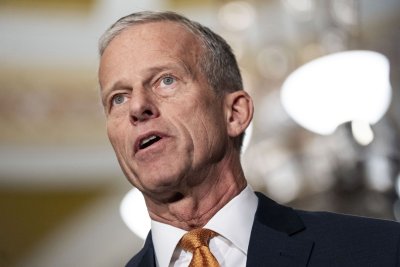U.S. Senate convenes on 34th day of shutdown

Nov. 3 (UPI) — The U.S. Senate reconvened Monday afternoon for a possible funding bill as the federal government shutdown moved one day closer to a record 35 days, set in 2019 during President Donald Trump‘s first term.
There have been 13 unsuccessful procedural votes on a House-passed continuing resolution, which would fund the government through Nov. 21.
The Senate convened at 3 p.m. after last meeting on Thursday. The House hasn’t been in session since Sept. 19. The government shut down on Oct. 1.
Senate Majority Leader John Thune told reporters Monday that he is “optimistic” but not necessarily “confident” senators from both parties will reach a deal to reopen the government this week.
“Based on sort of my gut of how things operate, I think we’re getting close to an off-ramp. But this is unlike any other government shutdown in terms of the way Democrats reacted to it,” he said.
Thune hopes to have an agreement this week because the Senate is scheduled to be in recess next week for Veterans Day.
“There were a lot of conversations over the weekend and hopefully that will bring about the desired result,” Thine said. “But you know, if we don’t start seeing some progress or some evidence of that by at least the middle of this week, it’s hard to see how we would finish anything by the end of the week. And I think that would be the objective here, to try and get something that we could send back to the House that would open up the government.”
Thune said he is agreeable to extending the resolution until January.
Speaker Mike Johnson said Monday that GOP leaders are discussing ways to deal with the expiration date of the continuing resolution that passed the House 217-212 on Sept. 19.
The House only needs a majority to pass legislation.
In the Senate, they have failed to reach the required 60 votes. The Republicans have a 53-47 advantage.
Trump has called for Senate Republicans to “get rid of the filibuster” to allow them to pass the stopgap funding bill with a simple majority. The so-called “nuclear option” would eliminate the need for the 60-vote supermajority typically required to pass legislation in the upper chamber.
Thune said he’s against invoking the nuclear option for fear Democrats would use it as a precedent and take advantage of it when they control the Senate in the future.
In fact, he said Monday that there’s not enough support among his colleagues on scrapping the filibuster.
“The votes aren’t there,” Thune told reporters.
The Trump administration opposes negotiating with Democrats on healthcare until the government reopens. The Democrats don’t want to approve any funding bill until subsidies for the Affordable Care Act, known as Obamacare, are extended into next year.
“Our position has been very clear,” one White House official told CNN. “The clean CR [continuing resolution] needs to be passed, and then there’s room for talks after that.”
The White House is calling it a “Democratic shutdown” on its website and social media.
A bipartisan quartet of House lawmakers released a “statement of principles” Monday for an extension of Obamacare subsidies for two years and an income cap for eligibility, Politico reported. It was by Republican Reps. Don Bacon of Nebraska and Jeff Hurd of Colorado, and Democratic Reps. Tom Suozzi of New York and Josh Gottheimer of New Jersey.
House Minority Leader Hakeem Jeffries of New York said lawmakers have been on a “taxpayer-funded vacation” instead of negotiating and Trump was at his home in Florida, including hosting a $1 million-per-play campaign fundraising dinner.
“What’s Donald Trump been doing this weekend? He was on the golf course, spitting in the face of the American people with his inaction and his indifference,” Jeffries said.
Only essential personnel are working and without pay. That includes air traffic controllers. Flights have been delayed at airports throughout the nation. At last 670,000 federal employees have been furloughed and roughly 730,000 working without pay. In past shutdowns, workers off the job received back pay.
“There is a level of risk that gets injected into the system when we have a controller that’s doing two jobs instead of one,” Transportation Secretary Sean Duffy said Sunday on ABC News’ This Week. “We will delay, we will cancel, any kind of flight across the national airspace to make sure people are safe.”
Flights are being spaced out to handle the diminished staff.
From Friday morning until Sunday night, 98 Federal Aviation Administration facilities reported a “staffing trigger” in which air traffic controllers had to alter operations to keep the airspace safe.
FlightAware reported 5,890 total delays involving U.S. airports on Sunday. The delays aren’t only related to air traffic control issues.
